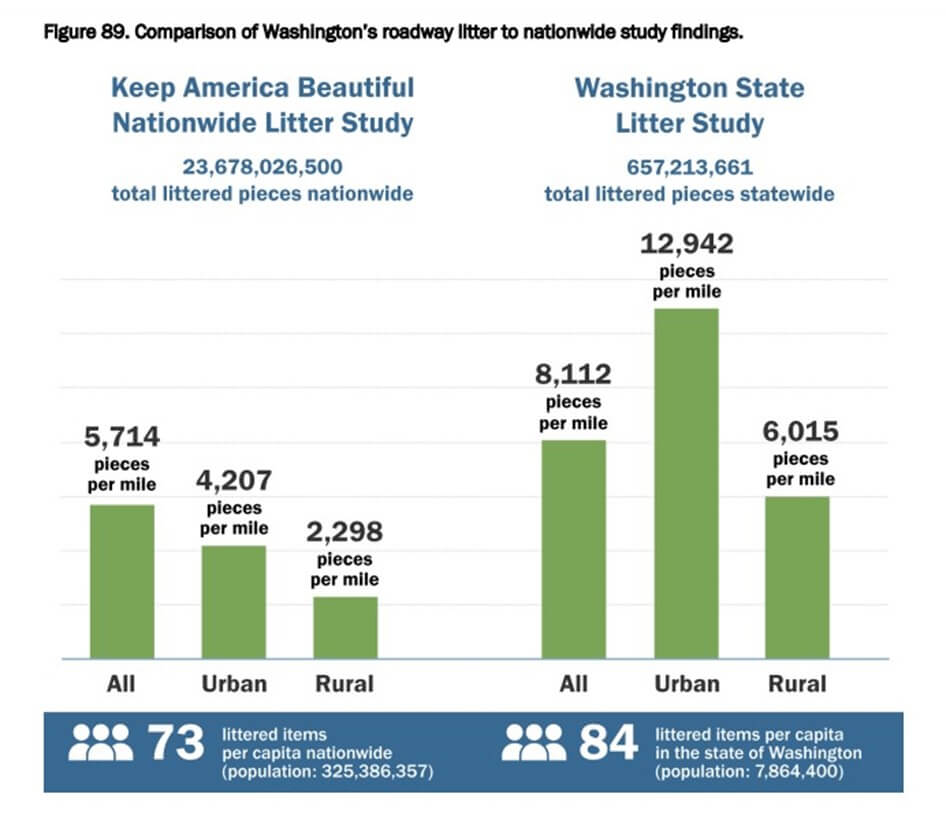Litter in Washington state: a big, costly problem with a simple solution

September 24, 2024
Good news: 75% of Washingtonians don’t litter, according to research by the Washington State Department of Ecology (DOE).
Bad news: The litterbugs cause “expensive cleanups, dangerous road conditions, loss of community tourism, and big environmental impacts.” In addition to safety risks, the unsightly debris can harm wildlife and water quality. Collectively, the litter amounts to 7.1 billion items per year, or about 897 pieces per person, well above the national average.
In hopes of reducing the 38 million pounds of litter that’s tossed on Washington’s highways, roads and public areas every year – about five pounds of trash for every person in the state – DOE and the state’s Department of Transportation, State Patrol and other agencies have launched a “Simple As That” campaign. The campaign consists of advertising, outreach messages, highway signs, window clings, posters, gas station pump toppers in English and Spanish, plus free reusable car litter bags (while supplies last). Rosauers Supermarkets, Fred Meyer Stores and community groups are partners for the litter bag giveaway.
DOE is also introducing the “Keep Washington Litter Free” campaign in collaboration with some community-based organizations for individuals and families who are new to the United States.
“We are proud to partner with Ecology to create cleaner, healthier communities for all Washingtonians,” said Dr. Ilena Ponce-Gonzalez, executive director of the Community Health Workers Coalition for Migrants and Refugees.
In 2023, Ecology funded programs that picked up more than 5.6 million pounds of litter and cleaned over 20,800 miles of road across the state.
Ecology-funded litter programs are directed to a variety of litter pickup, prevention, and enforcement efforts statewide. In addition to DOT and the State Patrol, partners include the state’s Ecology Youth Corps, program grants for community litter and ramp litter cleanup programs, Department of Natural Resources’ Correctional Camps program, Department of Fish and Wildlife Lands and Waters program, Department of Corrections Work Crews program, the Parks and Recreation Commission, and the Traffic Safety Commission.
Washington spends more than $12 million annually picking up litter. Paid crews and volunteers collected a record 11.2 million pounds in 2023, but that is only a fraction of the trash that accumulates.
To help defray the costs, Washington established a litter tax in 1971. Retail items typically found in roadside litter are assessed at a rate of 0.015%, which generates around $14 million annually for the Waste Reduction, Recycling, and Litter Control Account. The self-imposed tax applies to manufacturers, wholesalers, and retailers of 13 categories of products.

Other revenue is generated from fines. Littering, illegal dumping or driving with an unsecured vehicle load in Washington could result in fines from $103 up to $5,000. Lit debris such as cigarettes carry large fines. Many cities and counties have local ordinances that are stricter than state law.
A 2022 statewide litter study identified the most commonly littered items. The list includes cigarette butts, food wrappers and snack bags, glass bottles, construction and demolition debris, and cardboard boxes. The research showed there is an average of 73,580 pieces of litter amounting to 1,579 pounds per mile on Washington’s interstate highways. Local roads, considered the least littered, have 18,051 pieces per mile per year.
“It costs nothing for each of us to do the right thing and pick up after ourselves. Whether it’s keeping a trash bag in your car or making sure your cargo is securely strapped down, everyone one of us can do something to protect Washington’s natural beauty and prevent serious hazards on our highways,” stated Washington Gov. Jay Inslee during the campaign launch on September 13.
The litter tax was one component of the Model Litter Control Act when it was passed in 1971. That law aimed to change habits and behaviors of citizens through strong education programs. The Act also set fines and enforcement policies for littering, created a youth jobs program in litter pickup, required the placement of garbage cans in certain public places and other litter control efforts. Since inception, the Ecology Youth Corps has proved to be one of the most impactful litter programs resulting in retrieval of more than a million pounds of litter every year . For more than 12,000 Washington teens, picking up trash offered work experience, friendships, a sense of teamwork, and “even a little fun.” It’s also instilled an environmental ethic within them.
#LitterFreeWA
